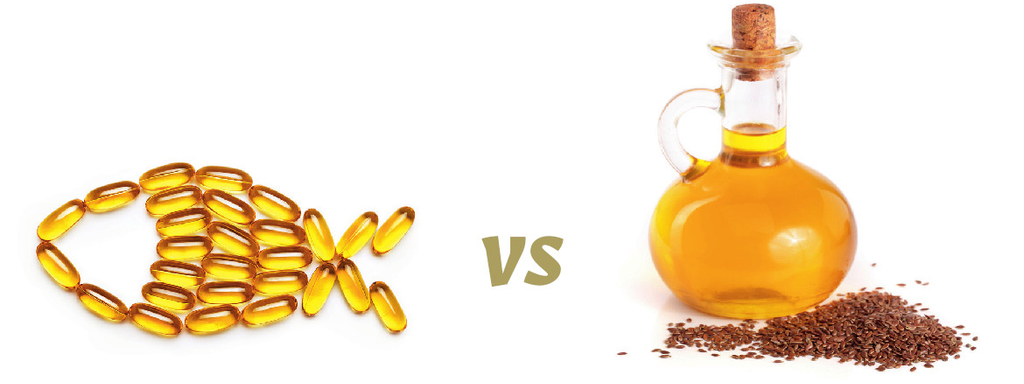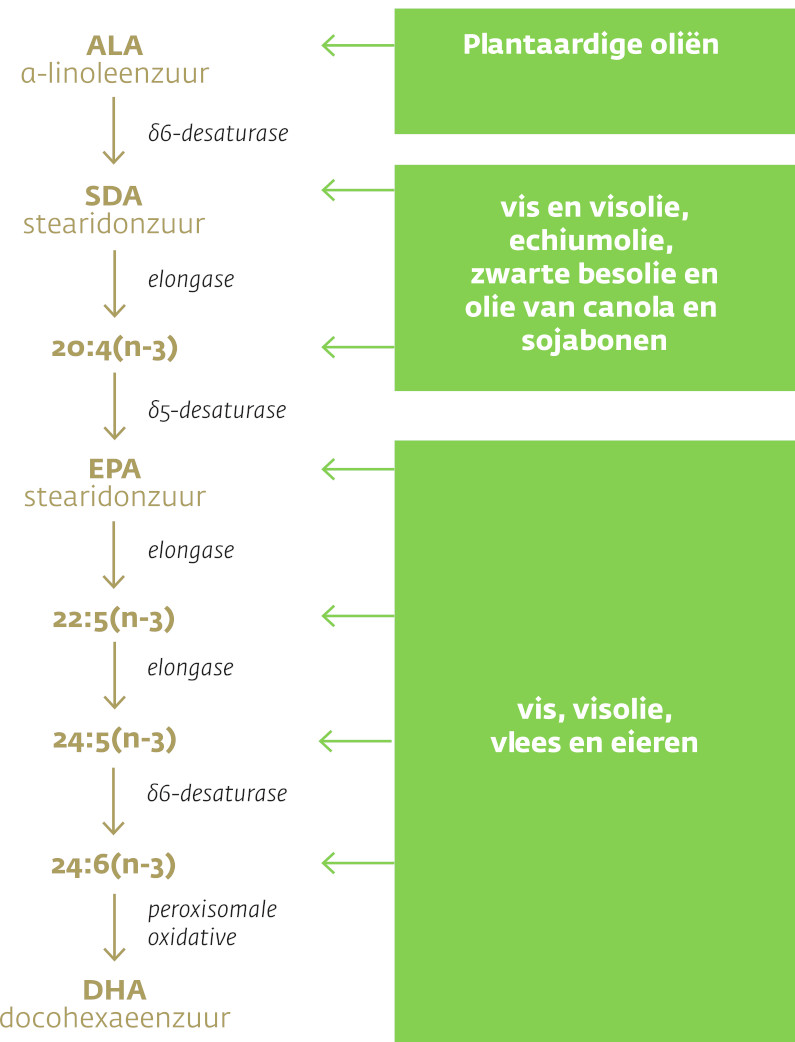
Door de erkenning van gezondheidsclaims op eicosapentaeenzuur (EPA) en docosahexaeenzuur (DHA), de welvaartsgroei en het toenemende gezondheidsbewustzijn is de markt voor omega-3-vetzuren sterk gegroeid. Hetzelfde geldt voor de visproductie en -consumptie. Tegelijkertijd is er om allerlei redenen steeds meer belangstelling voor alternatieve bronnen. Hoe kun je met plantaardige voeding optimaal profiteren van de vastgestelde gezondheidseffecten van EPA en DHA?
Beste bezoeker, u heeft geen toegang.
Enkel (web)abonnees hebben toegang tot tijdschriftartikelen. Het webabonnement is nog in de maak.
U kunt zich wel alvast (gratis) registreren en tal van andere webartikelen raadplegen!
Auteur
Verschenen in
Referenties
Eicosapentaeenzuur en docosahexaeenzuur – Achtergronddocument bij Richtlijnen goede voeding 2015. Den Haag: Gezondheidsraad, 2015; publicatienr. A15/17
Li,K. et al. Effect of marine-derived n-3 polyunsaturated fatty acids on C-reactive protein, interleukin 6 and tumor necrosis factor α: a meta-analysis. PloS one, 2014, 9.2: e88103.
Bernstein, A. M., et al. A meta-analysis shows that docosahexaenoic acid from algal oil reduces serum triglycerides and increases HDL-cholesterol and LDL-cholesterol in persons without coronary heart disease. The Journal of nutrition, 2011, 142.1: 99-104.
Qin, B., et al. Fish intake is associated with slower cognitive decline in Chinese older adults. The Journal of nutrition, 2014, 144.10: 1579-1585. SCHLEICHER, Molly, et al. Diminishing risk for age-related macular degeneration with nutrition: a current view. Nutrients, 2013, 5.7: 2405-2456.
Abdelhamid, A. S., et al. Omega‐3 fatty acids for the primary and secondary prevention of cardiovascular disease. Cochrane Database of Systematic Reviews, 2018, 11.
FAO (2016) The State of World Fisheries and Aquaculture 2016. Contributing to food security and nutrition for all. Rome. 200 pp.
Jackson, JBC, et al. Historical overfishing and the recent collapse of coastal ecosystems. science, 2001, 293.5530: 629-637.
Burdge, G. C. Metabolism of α-linolenic acid in humans. Prostaglandins, leukotrienes and essential fatty acids, 2006, 75.3: 161-168.
Plourde, M. Cunnane, SC. Extremely limited synthesis of long chain polyunsaturates in adults: implications for their dietary essentiality and use as supplements. Applied physiology, nutrition, and metabolism, 2007, 32.4: 619-634.
Davis, B.C.et al. Achieving optimal essential fatty acid status in vegetarians: current knowledge and practical implications. The American journal of clinical nutrition, 2003, 78.3: 640S-646S.
Gibson, R.A. et al. Conversion of linoleic acid and alpha‐linolenic acid to long‐chain polyunsaturated fatty acids (LCPUFAs), with a focus on pregnancy, lactation and the first 2 years of life. Maternal & child nutrition, 2011, 7: 17-26.
Rajaram, S. Health benefits of plant-derived α-linolenic acid. The American journal of clinical nutrition, 2014, 100.suppl_1: 443S-448S.
Abdelhamid, A. S., et al. Omega‐3 fatty acids for the primary and secondary prevention of cardiovascular disease. Cochrane Database of Systematic Reviews, 2018, 11.
Brouwer, I. A. et al. Dietary α-linolenic acid is associated with reduced risk of fatal coronary heart disease, but increased prostate cancer risk: a meta-analysis. The Journal of nutrition, 2004, 134.4: 919-922.
Leitzmann, M. F., et al. Dietary intake of n− 3 and n− 6 fatty acids and the risk of prostate cancer. The American journal of clinical nutrition, 2004, 80.1: 204-216.
Mayhew AJ, Anand SS, Mente A et al. A systematic review and meta-analysis of nut consumption and incident risk of CVD and all-cause mortality. Br J Nutr. 28 jan.2016;115(2):212-25
Gezondheidsraad. Alfa-linoleenzuur- Achtergronddocument bij Richtlijnen goede voeding 2015. Den Haag: Gezondheidsraad, 2015; publicatienr. A15/07.
Whelan J. Dietary stearidonic acid is a long chain (n-3) polyunsaturated fatty acid with potential health benefits. J Nutr. 2009 Jan;139(1):5-10
Lemke SL, et al. Consumption of stearidonic acid-rich oil in foods increases red blood cell eicosapentaenoic acid. J Acad Nutr Diet. 2013;113(8):1044-1056.
Walker CG. Et al. Stearidonic acid as a supplemental source of ω-3 polyunsaturated fatty acids to enhance status for improved human health. Nutrition. 2013;29(2):363-369.
James MJ, et al. Metabolism of stearidonic acid in human subjects: comparison with the metabolism of other n-3 fatty acids. Am J Clin Nutr. 2003 May;77(5):1140-5
Surette ME, et al. Dietary echium oil increases plasma and neutrophil long-chain (n-3) fatty acids and lowers serum triacylglycerols in hypertriglyceridemic humans. J Nutr. 2004 Jun;134(6):1406-11)
Forrest LM, et al. Echium oil reduces plasma triglycerides by increasing intravascular lipolysis in apoB100-only low density lipoprotein (LDL) receptor knockout mice. Nutrients. 2013;5(7):2629-2645
De Groot, RHM et al. Non-dietary factors associated with n-3 long-chain PUFA levels in humans–a systematic literature review. British Journal of Nutrition, 2019, 1-16.
Allaire J., et al. Supplementation with high-dose docosahexaenoic acid increases the Omega-3 Index more than high-dose eicosapentaenoic acid. Prostaglandins, Leukotrienes and Essential Fatty Acids, 2017, 120: 8-14.
Guo X. et al. n-3 polyunsaturated fatty acids and metabolic syndrome risk: A meta-analysis. Nutrients, 2017, 9.7: 703.
Allaire J., et al. A randomized, crossover, head-to-head comparison of eicosapentaenoic acid and docosahexaenoic acid supplementation to reduce inflammation markers in men and women: the Comparing EPA to DHA (ComparED) Study. The American journal of clinical nutrition, 2016, 104.2: 280-287.
van Hoytema N., Winkel.D De Zin en Onzin van Visolie, 21 augustus 2017 - Stichting Sea First
WUR (2017) Algae: our original omega-3 source. Wageningen University & Research PUFAChain project 6 pp.
Bernstein, A. M., et al. A meta-analysis shows that docosahexaenoic acid from algal oil reduces serum triglycerides and increases HDL-cholesterol and LDL-cholesterol in persons without coronary heart disease. The Journal of nutrition, 2011, 142.1: 99-104.
Maki, K. C., et al. A new, microalgal DHA-and EPA-containing oil lowers triacylglycerols in adults with mild-to-moderate hypertriglyceridemia. Prostaglandins, Leukotrienes and Essential Fatty Acids (PLEFA), 2014, 91.4: 141-148.
Wells, M. L., et al. Algae as nutritional and functional food sources: revisiting our understanding. Journal of applied phycology, 2017, 29.2: 949-982.
Sprague, M. et al. Microbial and genetically engineered oils as replacements for fish oil in aquaculture feeds. Biotechnology letters, 2017, 39.11: 1599-1609.
Bimbo, A.P. Current and future sources of raw materials for the long‐chain omega‐3 fatty acid market. Lipid Technology, 2007, 19.8: 176-179.
Passi S. et al. Fatty acid composition and antioxidant levels in muscle tissue of different Mediterranean marine species of fish and shellfish. J Agric Food Chem. 2002;50:7314–22.






